#Philosophical anthropology
Text
There have certainly been periods (and will be again in the future) when this fissure was not spoken of and the consciousness of the constitutive homelessness of the human being was covered over by strong ties to land and family, to hearth and ancestors. But these periods were not at peace, either, unless they sought peace. The idea of paradise, of the state of innocence and the Golden Age, which every human generation has known (today this idea is called 'community') points to what the human lacks and to his knowledge of this lack, by virtue of which he stands above the animal. As an excentrically organized being, the human must make himself into what he already is.
-- Plessner, Levels of Organic Life and the Human
#plessner#philosophical anthropology#philosophy#helmuth plessner#life#human#homelessness#human being
1 note
·
View note
Text
When Scripts of Nationalisms are not Celebrated: Scenario of Recent Violence in India

The recent violence between two communities which recently engulfed the capital city of India claimed nearly 50 lives being lost and several hundred being critically injured. In addition people suffered due to material losses and mental health traumas. We generally consider mob violence naturally erupts phenomena, therefore, no capital punishment for the rapist during violence in India. However, it is a serious symptom that when violence becomes part of a political and ideological script, then its implementation is a political must. We recently witnessed this political-ideological sanction that has been coupled with administrative judiciary impunity. This situation poses a question, why does our society fail to look beyond religious and ideological differences even though we claim to live in a democracy and we have a constitution that uphold rights and value? Why we failed to develop a mass-psyche that upholds humanity beyond differences? This question seeks to investigate an in-depth analysis of culture, economy and political nexus that stitch together the fabric of a nation.
Read more about this article:
https://lupinepublishers.com/anthropological-and-archaeological-sciences/fulltext/when-scripts-of-nationalisms-are-not-celebrated-scenario-of-recent-violence-in-india.ID.000129.php
Read more Lupine Publishers Google Scholar Articles:
https://scholar.google.com/citations?view_op=view_citation&hl=en&user=w-I2_wEAAAAJ&cstart=20&pagesize=80&citation_for_view=w-I2_wEAAAAJ:WqliGbK-hY8C
#cultural anthropology#philosophical anthropology#Lupine Publishers Group#Lupine Publishers LLC#Lupine publishers
0 notes
Text
late night thoughts
i've been thinking about philosophy a lot lately... but not as in the subject i study or anything. more as in what's the purpose of life?
i once thought it meant becoming very good at one thing and making it big. or having a passion and following it with all you had, going up the ladder. but now that i've been in the workforce for about a year, this all does not illusion me like it once had. i'm very disillusioned now. i'm maybe even suspicious if anyone ever talks to me about their dreams in life, their goals, their greatest ambitions and how they will do everything they can to reach them.
and i say this while being a part of the studyblr community lol (which basically promotes these ideas of dreams and passions).
why is there so much importance given to being successful? and what does that even mean? if you ask me, most of the time success is defined by someone else's terms.
#studyblr#thoughts#philosophy#philosophical thoughts#living under capitalism#capitalism#sociology#anthropology
41 notes
·
View notes
Text
the way everyone on this site just assumes all atheists r ex-christians is really fucking gross lol. and frankly just goes to show how christian-centric 99% of you still are.
#atheism#atheist#agnostic#agnostisizm#judaism#like 70% of jews r athiests u ignorant dicks lol. and like 80% of athiest philosophers r jewish#tho major atheist thinkers come from every culture and religion that exists. fucking obviously. u narrow minded idiots??#atheists and agnostics and rational thinkers come from all kinds of religious backgrounds its literally the oldest worldview#a lot older than any religion lol#like why do u think everyone who doesnt think like u has to be a broken version of what u already are. shut up shut up shut UPPPP#none of u know 1 single thing about history or science or culture or anthropology and it fucking shoooows#~culturally christian~ for the love of fuck please stop using this term none of u know what it means#sorry i got hatemail#gingerswagfreckles#jewish history
57 notes
·
View notes
Text
i love how sometimes i will have wholeass conversations with myself which are about things which would probably make for an insanely good philosophy doctoral thesis. but i dont write em down anywhere or tell em to anyone else so i forget them like 15 minutes after I say them and then just move on with my life
#grymms spectacular fucking posts#i was in the shower having a whole convo about the human tendency towards labels and how they are usually applied and how they can reflect#upon the groups and cultures and societies within which they exist and how oftentimes they can be counterproductive by overcomplicating#communication as opposed to streamlining it#this might be a bit more of a linguistics and/or anthropology thing than philosophy but thats just the most recent example of this#also im not saying this to brag or say im smart cus being a good philosophy doctoral thesis doesn't mean something is intelligent#being a philosopher doesn't necessarily require intelligence. just reflection
10 notes
·
View notes
Text
a peruvian teacher from my school gave me some literature recommendations of peruvian writers!!! i'm so happy!!!!!
#i love learning shit#my number one is the essays which are like philosophical/ anthropological#i'm on a physics lesson rn and I'm barely able to focus. fuck this shit i want to read those essays NOW ;_;
10 notes
·
View notes
Text
Divine Dichotomies
The way that ancient gods represented things like authority, war, and the sky, while ancient goddesses represented things like wisdom, fertility, and the arts.
The way that ancient gods were offered weapons and metals and sacrifice of large animals and men, while ancient goddesses were offered milk and grains, sweet foods and flowers, and smaller animals like birds.
The way that ancient gods were worshiped within temples on top of hills and grand structures, while goddesses were worshipped near bodies of water or near caves.
#philosophy#ancient history#history#greek mythology#roman mythology#egyptian mythology#ancient civilizations#writing#psychology#anthropology#human history#religion#gender#feminism#divine feminine#divine masculine#poetry#literature#philosopher#sociology#theology#journal#mine
11 notes
·
View notes
Text
William Willis
William Willis was born in 1921 in Waco, Texas. His parents were affluent, college-educated African Americans. His father served first as an educator and then started a construction company. The family moved to Dallas when Willis was two "partly in response to an ultimatum from the Waco Klu Klux Klan" (Zumwalt 1). His father died a few years later and he was raised by his mother. Although he attended segregated schools, his family also traveled widely -- a habit he would keep up throughout his life.

William Willis from his Howard yearbook, via AmPhilSoc (as are all other images in this page)
Willis was a quiet, bookish child and went on to Howard University, where he graduate cum laude in 1942. It was there that he developed an interest in the sociology and history of the Black experience int he United States. Once out of school, he volunteered to join the Coast Guard and spent the war stationed in Boston. Afterwards, he decided to attend graduate school in anthropology at Columbia because he "assumed that this discipline was the vanguard in the attack against racist thought" (Zumwalt 2). He was thus in the same class of students as Eric Wolf, Marvin Harris, Morton Fried, Sydney Mintz, and Robert Murphy. He became interested in the history of Black and Indian relations, as wrote a dissertation based on library research on "colonial conflict and the Cherokee Indians, 1710-1760" and recieved his Ph.D. in 1955.
During his time at Columbia he married his life partner Georgine "Gene" Upshur, who came from a prominent African American family in Philadelphia. Her father was a Republican congressman in Pennsylvania's lower house and also, as it happened, the mortician who buried Bessie Smith, the great blues singer. She earned a BA in sociology and wanted to go on to study social work, but he father agreed to support her studies only if she also went to mortician school so that she would have a steady source of financial support. "People will always need an undertaker" he told her (Zumwalt 5). She was doing her masters in social work when she met Willis.
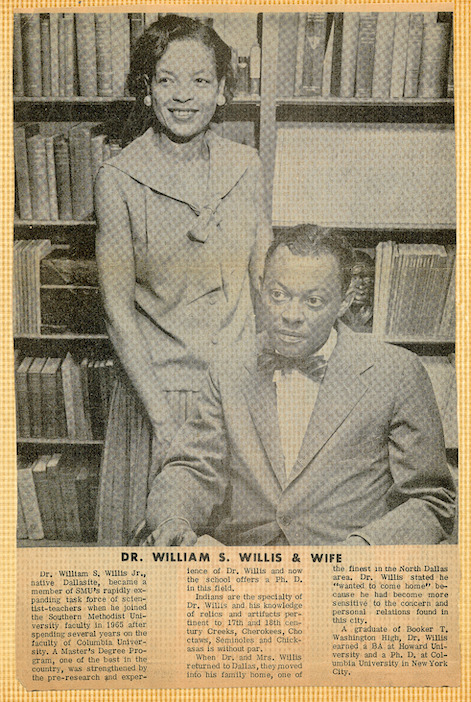
From 1955 to 1964 Willis tried unsuccessfully to pursue a career in anthropology. He applied to the Ford Foundation for a research grant and was turned down. He applied for teaching positions but was told by Duncan Strong (the department chair at Columbia) that no one would hire a black person. He and his wife lived in New York for nearly a decade and Willis published work while teaching part-time as a lecturer at Columbia and City College. In 1963 Willis's mother died of a heart attack and Willis and Gene decided to move back to Dallas to live in the family home.
Willis's luck turned on his return to Dallas. It was 1964, the high-water mark of the civil rights movement, and Southern Methodist University was looking to integrate its faculty. In 1965 he was hired to a position in anthropology. He was a tremendous success at the new institution, drawing large classes of students and helping to establish an MA and Ph.D. program in the department. He earned tenure and became a full professor. His wife became active in several local organizations -- at last, the Willis's were flourishing.
In the late 1960s, life again became difficult for Willis. His department chair, a racist, began harassing him -- this included actions like changing the locks on the office to his door and not giving him the key. Administrators above him supported his chair's behavior. Radical black politics came to campus, and militant student activists began making increasingly large demands on the administration. Willis -- a quite, reserved man who alway wore a bowtie in public -- found himself deeply sympathetic to the activists and became radicalized himself. As the only black professor on campus, he became a key player negotiating their relationship to the administration. It was in this context that he wrote his piece "Skeletons in the Anthropological Closet". He considered alternate titles for the essay, including "anthropologist as vulture" and "anthropologist as exploiter".

Willis at SMU, via APS
The Willises found it difficult to bear the brunt of the constant harassment they faced at SMU. Their health began to break down. Willis experienced constant pain in his abdomen and was afraid it was cancer -- in fact, it was stress. Gene began fainting in public. Willis decided to take a leave of absence in 1971 to recover. The administration then altered his request to make it a 'terminal leave of absence', making it sound as if he had resigned his position! Willis fought back against this attempt to remove him, but soon realized that if he stayed at SMU he would spend his entire life fighting the administration for his rights. When his leave of absence was over, he resigned from SMU. He had been there less than a decade.
Willis and Gene moved to Philadelphia, Gene's home town. They moved in with her mother and Gene's mortician experience ended up proving valuable, and the family business helped support both her and Willis. One of the upsides of the move was that the American Philosophical Society was based in Philly. Willis began his next and (as it turns out) final project there, combing through the massive archive of the Franz Boas paper. He became a fixture in the reading rooms of the society, well-known to the librarians and archivists who worked there. His initial plan was to write about the sort shrift Boas and his colleagues gave to Black Americans, but the more time he spent reading Boas, the more ambivalent he became. He came to see Boas as both an anti-racist activist and someone who at times seemed to harbor racist views of Black people.

Willis in the PBS Special "Shackles of Tradition" about Franz Boas. The entire documentary is on YouTube
Wilis began writing a book on the history of American anthropology's study of African Americans. Alas, this study was never to be finished. On 8 August 1983 Willis left the reading room, went home, and died of a massive heart attack. He was 62 years old. His papers are now in the APS library and his wife Gene has established a fund to support the study of race (APS Willis feature).
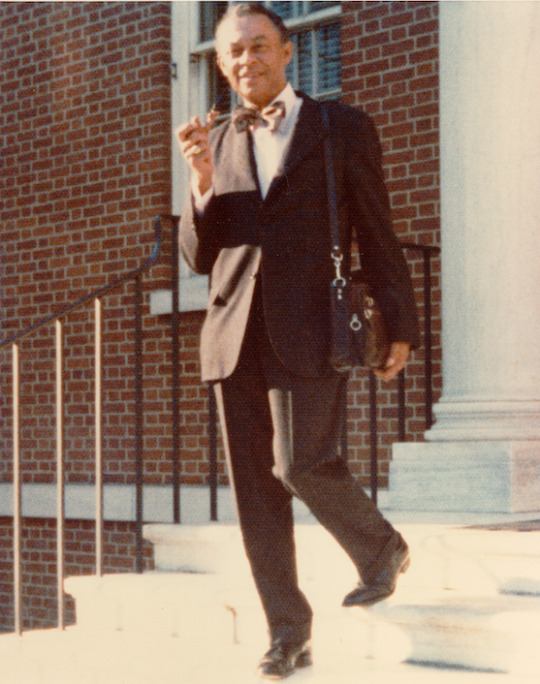
Via APS
Willis had little lasting influence on the discipline of anthropology. Although his "Skeletons" essay is now more widely taught, he did not train graduate students who could keep his memory alive. The first chapter of his book on Boas was published posthumously, but the rest of the work was already created. Today, Willis is remembered as a pioneer of African American anthropology but, to be honest, his biography shows us both the story of a model scholar and the tragedy of race in America.
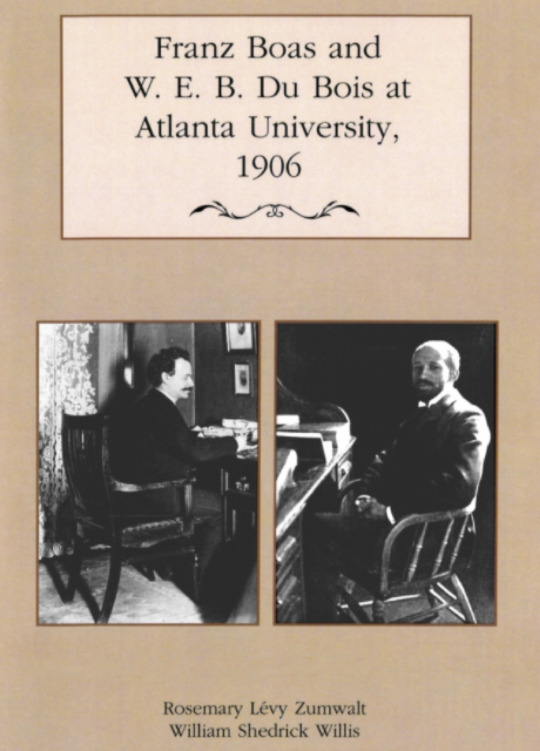
Willis's final volume is available on JSTOR.
52 notes
·
View notes
Text
wish i could show you all my essay that i put soo much work in but it’s in german unfortunately
11 notes
·
View notes
Text
The Condemnation of Man: Analyzing Sartre’s Being and Nothingness
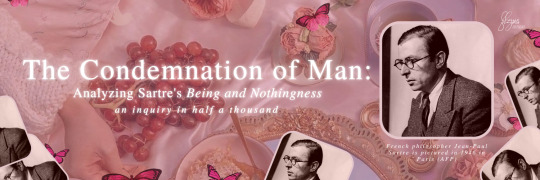
Jean-Paul Charles Aymard Sartre (1905-1980) was a prominent character in 20th-century French philosophy and Marxism, as well as one of the fundamental figures in the theory of Existentialism (and phenomenology). He was also a French dramatist, author, screenwriter, political activist, biographer, and literary critic.
In this post, we will be analyzing the philosophy behind Jean-Paul Sartre's Being and Nothingness (1943).

Jean-Paul Sartre’s Being and Nothingness was created during the war, it would only make sense for it to address war, and Being and Nothingness explicitly does so, addressing the war within ourselves. Sartre, throughout the excerpt, emphasized war, choice, negligence, and responsibility. Through the piece, I have realized that we accept what we are willing to accept and we choose what we are willing to choose. While there are outside factors to consider, it is still our choice and responsibility to intend to address those factors and move past them. We must own our struggles and make them ours for us to overcome. We are our own being and our own nothingness. We are responsible for the war that is brewing inside us and we are responsible for what we go through as they were all made possible through a series of choices that we are accountable for. This is how our past and our future interconnect. By choice, by reason, and by fault. With this, we must learn to carry the weight of our choices by ourselves and not rely on others to carry our faults for us – it would simply be passing our nothingness on to another burdened person.

Sartre emphasized that we must be without remorse or regrets as we are without excuses. I feel as if this implies that we should not linger on what could have been, what should have been, and our regrets – rather, we should move forward and own up to our choices, and instead celebrate what has yet to come. Perhaps the key to recognizing the existence of nothingness within us can be solved by simply moving forward.
However, another thought to ponder would be the statement, “I did not ask to be born.” This furthers the questions behind existentialism. Are we or are we not responsible for being born? What exactly is the purpose of my being here? While those are questions to ponder, there are also statements to reflect on. That we may not be entirely responsible for our being here, however, we are entirely responsible for what we are doing whilst being here. Our existence would then rely on our purpose and what we can bring to this world. Our purpose would perhaps be to decide as even choosing to be passive and stagnant is a choice that we make for ourselves. Mediocrity would still be a choice. Settling would still be a choice. To quote Sartre, “Thus in a certain sense, I choose being born.”

Perhaps the reason for our existence is to make it our own as in every one of us, there lies a war – and in every one of us, there lies a warrior. It is up to us to accept the war within us and find meaning to why it exists. It is our responsibility to look for the nothingness within us and find meaning of it.

Haven’t had enough of Jean-Paul Sartre? Visit this link below for trivias on Jean Paul Sartre!
Interested in an accurate and educational video presentation on Jean-Paul Sartre? I’ve got you covered! Visit the link below to access Eternalised’s Sartre account!
Greatest Philosophers In History | Jean Paul Sartre
Want to hear more from me? Follow me on https://khaizienotes.tumblr.com/ and https://twitter.com/khaizienotes.

References:
Merriam-Webster. (n.d.). Nothingness. In Merriam-Webster.com dictionary. Retrieved September 2, 2022, from https://www.merriam-webster.com/dictionary/nothingness
#literature#classical#academia#reading#quotes#spilled thoughts#classic literature#spilled words#philosophical thoughts#philosophical anthropology#jean-paul sartre#existential thoughts#existential philosophy
1 note
·
View note
Text
"the gods have fashioned us for love" vs "killing must feel good to god too, he does it all the time, and are we not created in his image?"
FIGHT
5 notes
·
View notes
Text
Geophysical Fields and Signals of Some Pyramids

Instruments, methods and equipment for registration of geophysical fields and signals are described. Examples of records of seismic noise, seism acoustic emission and electromagnetic emission, accompanying emission processes, as well as seismic pulses are shown. Data on tilt of pyramid (Broken, Dakhshur) and gas samples from chambers of pyramids Khufu (Giza) and Red (Dakhshur) are presented.
Read more about this article:
https://lupinepublishers.com/anthropological-and-archaeological-sciences/fulltext/geophysical-fields-and-signals-of-some-pyramids.ID.000128.php
Read more Lupine Publishers Google Scholar Articles:
https://scholar.google.com/citations?view_op=view_citation&hl=en&user=w-I2_wEAAAAJ&cstart=20&pagesize=80&citation_for_view=w-I2_wEAAAAJ:5awf1xo2G04C
#cultural anthropology#philosophical anthropology#Lupine publishers#Lupine Publishers LLC#Lupine Publishers Group
0 notes
Text
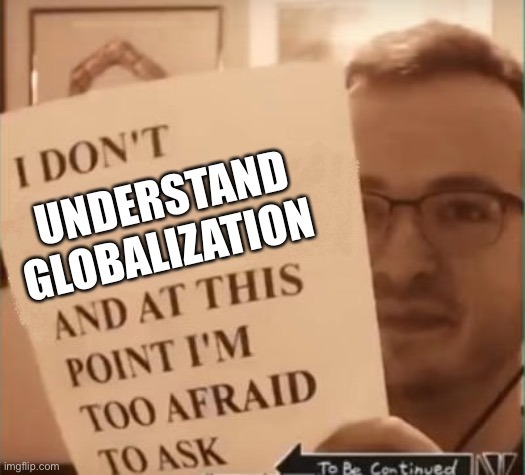
#I took sociology. And anthropology. And yet.#If someone would ask me to define or explain globalization I definitely can’t#Also on a side note:#Currently taking philosophy and I hate it#I hate philosophers#I would willingly fight any and all philosophers#I will personally fistfight Nietzsche and Kierkegaard#I will punch Descartes in the face#“Human rights are for everyone” ok but not for philosophers because they can’t decide what a human is#Am I just too dumb to understand this stuff? Nah I get it (I don’t.)#Philosophers be like “what’s the meaning of life” and then waste their whole lives trying to figure it out#Philosophers be like “life is meaningless” and not realize that they just have severe depression#Philosophers be like “despair is inevitable” And Still Not Realize They’re Just Severely Depressed#Maybe people in the 1800s didn’t know much about depression.#Whatever. I don’t see how that’s my problem.#If I wanted to here about how life is pointless I’d talk to literally anyone on this site. Since. Chances are. They also have depression.
1 note
·
View note
Text
crazy frog, axel f was every child's first autistic words - a dissertation
In the neurodiversity discourse, autism is explained by way of several modern-day disease vectors, such as a result of vaccination or childhood exposure to severe allergens and microplastics. There is little support for this explanatory model, however, particularly due to the lack of cross-interaction between autism spectrum traits and said vectors. On the other hand, the literature indicates that echolalia may be a promising explanatory factor.
Echolalia is the unsolicited repetition of vocalizations made by another person. Vocalizations can be phonemic and morphemic. In its profound form it is automatic and effortless. Echolalia is memetic by nature and therefore spreads vocalizations from person to person.
Theoretically, then, it may be a transmission mechanism for the increasing prevalence of autism spectrum disorder (ASD). In this dissertation, I will prove how Crazy Frog's viral song Axel F, which is ripe with echolalia-friendly vocalizations, contributed to the development of today's autistic population.
#pseudoscience#my 18th century philosopher-scientist thesis#ASD#autism#echolalia#neurodivergence#crazy frog is autistic culture#satire#creative medical anthropology#vaccine conspiracy theory
1 note
·
View note
Note
I understand your point, and indeed even more questions arose for me.
But first, from my limited epistemological and disciplinary knowledge, I will tell you several approaches and points.
First, I know that anthropology is malleable. In truth, from what I understand is that in each country (with its social, political and regional reality) there is a different anthropology… As would be the case of Latin America regarding an "anthropology in the south", as it is called here.
Secondly, it is curious the history of archaeology as a science apart from anthropology… But, the paths always bring the two together.
Third, I believe that fieldwork with ethnography is what can represent this "anthropology of the south"… But, it is certainly important to recognize how everything changes and how the labor market is equally vast… Although, don't you think that one should always maintain an identity as a discipline?
Thank you very much for reading me, and I apologize if there is any mistake.
See, some people would say that anthropology in Canada is also "defined" by ethnographic work, but that's not actually the case. It's just that ethnography is often the face of anthropology the public sees the most of, and what a lot of people think "real" anthropology looks like.
I don't think anthropology will ever have a single, central identity, and I don't think it needs one. A field that studies the entirety of human culture can't afford to limit its scope or its methods, because that's how vital perspectives get left out.
It has been argued that the field should be broken up into more manageable pieces, but that doesn't work either. I couldn't piece together the past without understanding how humans live and act today. Dr. S couldn't understand the experiences of modern migrants without understanding the migrations of the past in the area she studies. Dr. B couldn't study the roles of minority languages without understanding how people interact and why experiences shape the words we use. K couldn't study how the healthcare system fails Indigenous women without understanding both the history of Indigenous wellness and the current social fabric of our country.
We would all lose something if we didn't share a field. We couldn't do what we do as well without the other perspectives within anthropology.
That's why it's important that anthropology has the room to be different in different nations (or regions), or even different between different scholars or departments. That difference is what gives us even a slight chance of actually understanding humanity.
As a result, we can't say there is one unified identity behind anthropology. Humans are too vast and too messy a topic to put in such rigid constraints. When we try, things get lost in the gaps between categories. The only rule humans live by is that there's an exception to every rule, and if we try to limit and define our study of those exceptions, we stop representing human culture in academic spaces and start trying to tell humans how to be.
#this is getting a bit philosophical which admittedly is not my area#but i honestly don't think delineating the field in any way has value#especially when nobody i know keeps their anthropology within the lines of their subfield#if you want to discuss this in depth feel free to just message me#or comment on any of these posts that works too#anthropology#archaeology#to be honest i studied very little cultural anthropology in school#what i did was mostly environmental or folklore based#but as much of my study is talking to people as it is digging up artefacts
0 notes
Text
I keep encountering this category of book that philosophizes broadly about the direction of human life, society, and psychology, calling for a sort of change in our culture or values in some way. In this type of book the writer, implicitly or sometimes very explicitly, declares the ideas of "The Right" and "The Left" to be both fundamentally flawed, and proposes a revolutionary "middle ground" between the two. This middle ground turns out to be right-wing conservatism
The most striking characteristic of these books is that they are very multi-disciplinary in their approach, drawing upon anthropology, biology, sociology, psychology, economics, and history to make their conclusions. This makes the book seem very well-thought-out and provocative on the surface, since it uses such a wide variety of types of evidence and arguments to support its conclusions.
However, instead of having a well-rounded and insightful multidisciplinary analysis, the author is actually simultaneously at the top of a terrifying array of Dunning-Kruger peaks, knowing too little individually about any of the fields he draws upon to realize how little he knows, and is laying it all out like a royal flush of stupid.
1K notes
·
View notes